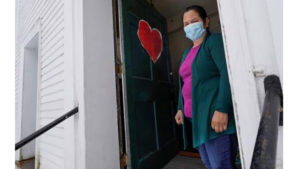 New York Attorney General Letitia James says she has led a coalition of 16 attorneys general from across the United States in fighting alongside US President Joseph Biden to protect undocumented Caribbean and other immigrants from deportation.
New York Attorney General Letitia James says she has led a coalition of 16 attorneys general from across the United States in fighting alongside US President Joseph Biden to protect undocumented Caribbean and other immigrants from deportation.
On the first day of the Biden-Harris Administration, the US Department of Homeland Security (DHS) issued a memo ordering a moratorium on deportations for 100 days, while a thorough review of the DHS’s policies took place.
Two days later, the state of Texas sued the Administration, seeking to overturn the moratorium.
Texas is now seeking a preliminary injunction to halt the moratorium while the case makes its way through the courts.
In an amicus brief filed in Texas v United States, James leads the coalition in asking the district court to reject Texas’s request for a preliminary injunction and deny the state’s efforts to dictate federal immigration policy through a last-minute “agreement” with the Trump Administration.
“This eleventh-hour deal by the Trump Administration and the state of Texas is nothing more than a last-ditch effort by the former president on his way out the door to hogtie every other state in the nation while simultaneously punishing immigrants,” James told the Caribbean Media Corporation (CMC) over the weekend.
“As we continue to reel from a public health crisis that has affected every corner of this country, the last thing we should be doing is moving to deport more immigrants — many of whom are working on the frontlines of the pandemic and delivering essential services to Americans nationwide,” she added.
“I am proud to lead this coalition in supporting President Biden’s efforts to freeze deportations, as the administration seeks to reform our nation’s overall immigration policies,” James continued. “As I have done since the beginning of my career, I will continue to stand shoulder-to-shoulder with our immigrant communities as we fight for reform.”
As part of a series of sweeping immigration reforms, the Biden-Harris Administration halted the deportation of undocumented Caribbean and other immigrants for 100 days on January 20, 2021.
However, days before President Biden took office, the state of Texas entered into an agreement with the Trump Administration that sought to hamstring the incoming Biden-Harris Administration before it had the opportunity to put in place its own policies and priorities concerning removal.
In the amicus brief — filed in the US District Court for the Southern District of Texas — James leads the coalition in arguing that Texas’ agreement with the previous Administration is not only unlawful but that it also presents serious issues related to federal immigration enforcement in New York and the other amici states, which are home to a significant share of the estimated 11 million undocumented immigrants in the United States.
James said Texas’ request for nationwide enforcement of an agreement that it alone signed with the DHS not only conflicts with federal law but also undermines the sovereignty of its fellow states.
As the amicus brief notes, “an outgoing presidential administration — after losing a national election by millions of votes — cannot handcuff the discretion of a new administration in its efforts to change national policies to reflect the will of the voters.
“In fact, the Supreme Court has repeatedly rejected attempts to prevent a newly elected executive branch from exercising the authority granted to it by Congress,” the brief stated.
Further, Attorney General James and the coalition highlighted the overwhelming contributions undocumented Caribbean and other immigrants bring to the nation.
Specifically, they said that undocumented immigrants contribute about US$6.8 billion in state and local taxes annually.
In addition, they said immigrants — both with and without documentation — are “critically needed employees in essential sectors, including those sectors vital to combatting the coronavirus (COVID-19) public health crisis by delivering goods and food, providing technological and human-resources support for telecommuting, offering telehealth and other in-person health care, assisting at grocery stories, and more.”
